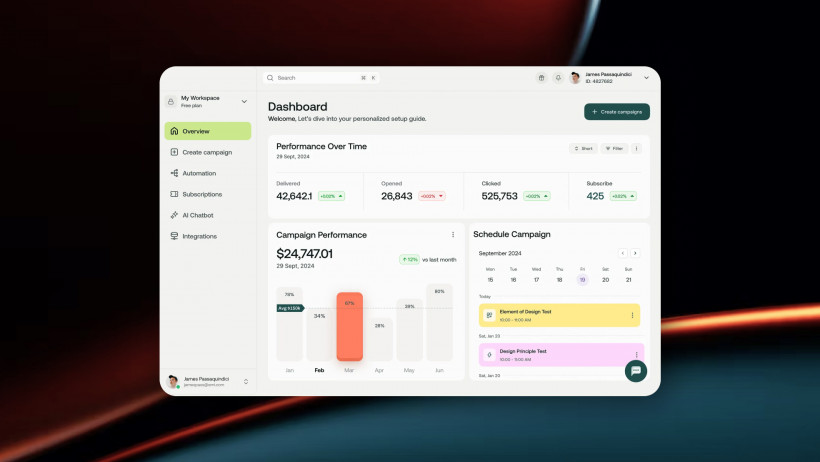Many service businesses overlook innovative CRM solutions or try to implement incompatible systems independently. Such decisions cause trouble in managing long-term clients. The workflow automation brought by the right CRM and its provider can boost any service company to a new level.
We have enlisted the support of our reliable partner, CRMiUM, to share key insights on service business CRM, as they are experts in implementing various CRM solutions for 10 years.
This article will explore key features of service business CRM software, the best CRM for service companies in 2026, how to choose a service CRM that suits you, and much more.
Why CRM is Crucial for Service-Based Companies in 2026
In 2026, CRM systems became essential to any company's work order management software. For service-based companies, field service management CRM is a requirement to stay competitive in today's digital market.
According to Nucleus Research (Nucleus Research is a company that provides ROI case studies, insights, benchmarks, and facts), CRM systems deliver an average return on investment (ROI) of $8.71 for every dollar invested. Thus, investing in a suitable CRM and hiring an expert team to set it up is worthwhile. Especially nowadays, when many CRM for service businesses can meet each company's unique needs.
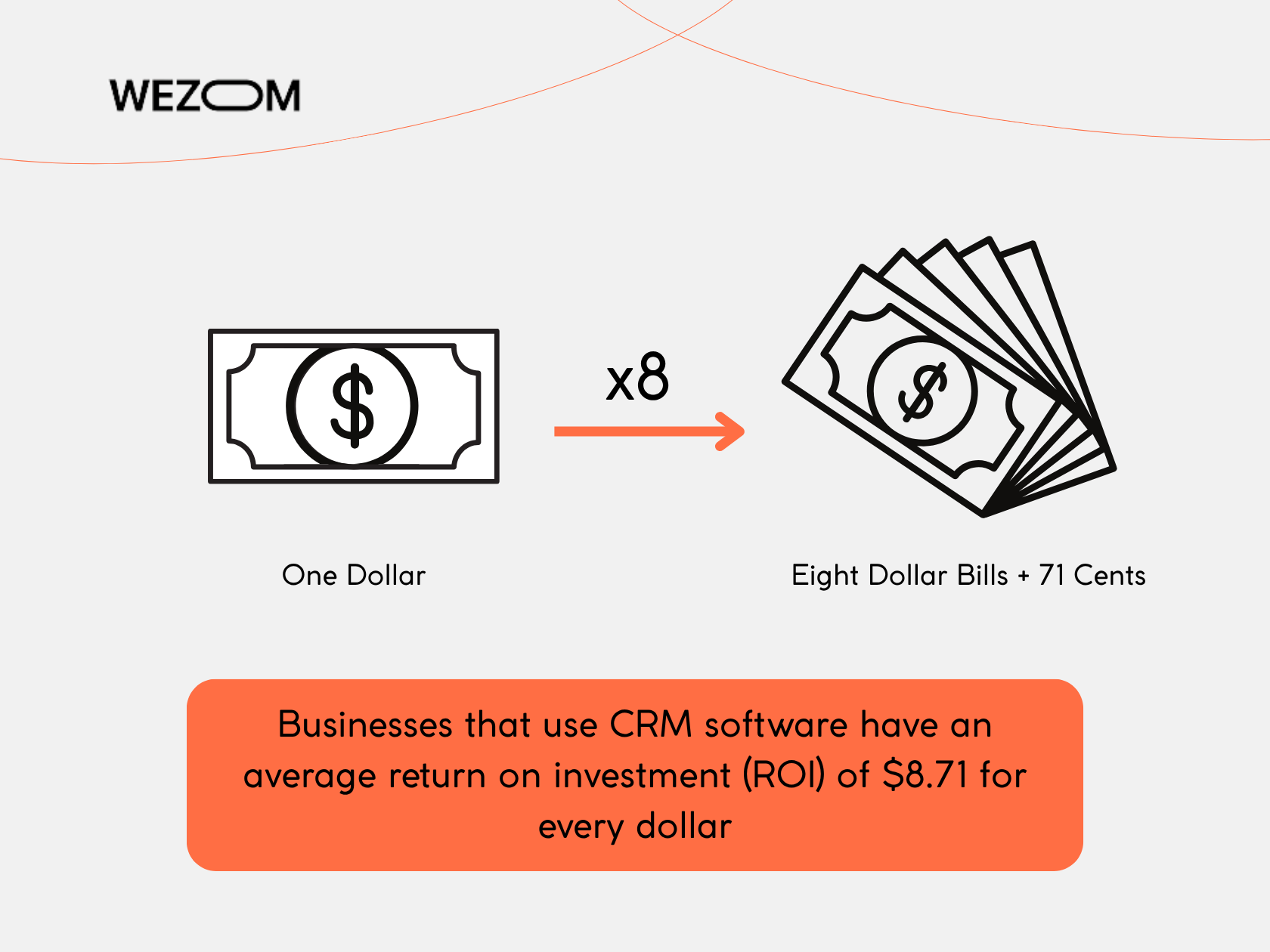
Source: Nucleus Research
The shift to remote service delivery, accelerated by the COVID-19 pandemic, further fueled CRM adoption. With teams working remotely and clients engaging online, businesses needed centralized platforms to maintain strong customer relationships, even without a physical presence.
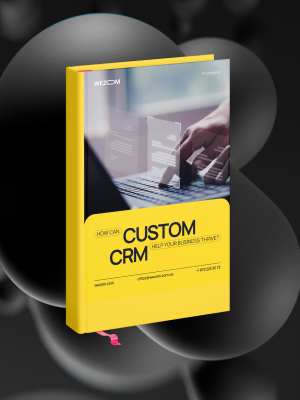
Key Market Trends Driving CRM Adoption in 2026:
- Increased demand for client-focused services
- Growth of omnichannel communication
- Remote and hybrid work models are becoming the standard
- Automation of routine tasks to improve efficiency
- Integration of AI for data-driven strategies
- Higher client expectations for real-time responses and proactive support
The rapid pace of digitalization in the last decade has transformed how businesses deliver services and how clients expect to interact with them. Clients now demand personalized experiences across all touchpoints.
Hence, companies create customer-centric service models. A generic approach no longer works; clients expect services tailored to their unique needs and preferences.
Despite CRM for service businesses being a valuable management tool today, companies often make their workflow and processes even more complicated as they attempt to set up CRM systems on their own. Many businesses fall into common traps:
- Overinvesting in complex systems that are underused
- Failing to align CRM with internal processes
- Neglecting staff training
- Not integrating CRM with other systems, causing data mismatches
- Lacking control over CRM usage and data quality
These mistakes significantly reduce productivity. A well-tailored CRM solution will streamline your operations. That’s why working with experienced CRM integration partners is essential. They ensure your system fits your business needs and delivers measurable value.
CRM for Service vs Product-Based Businesses
Everybody knows that CRM stands for customer relationship management. Generally, it is a type of sales software used for maintaining leads, following up on them, and converting them into customers. However, CRM for service-based businesses provides the tools for sales reps to turn leads into long-term clients. While people sometimes confuse product- and service-based CRM solutions.
There is a vast difference between CRM for service businesses and CRM for product-based companies. Customer interactions differ, so CRM's focus and functionality vary depending on whether it prioritizes relationship continuity or transactional sales.
Service-based companies rely on personalized communication and ongoing client management. Their success depends on customer satisfaction through consistent service quality.
Service-based CRMs should prioritize:
- Appointment booking
- Task management
- Customer support
- Detailed client histories
- Tracking service delivery over time
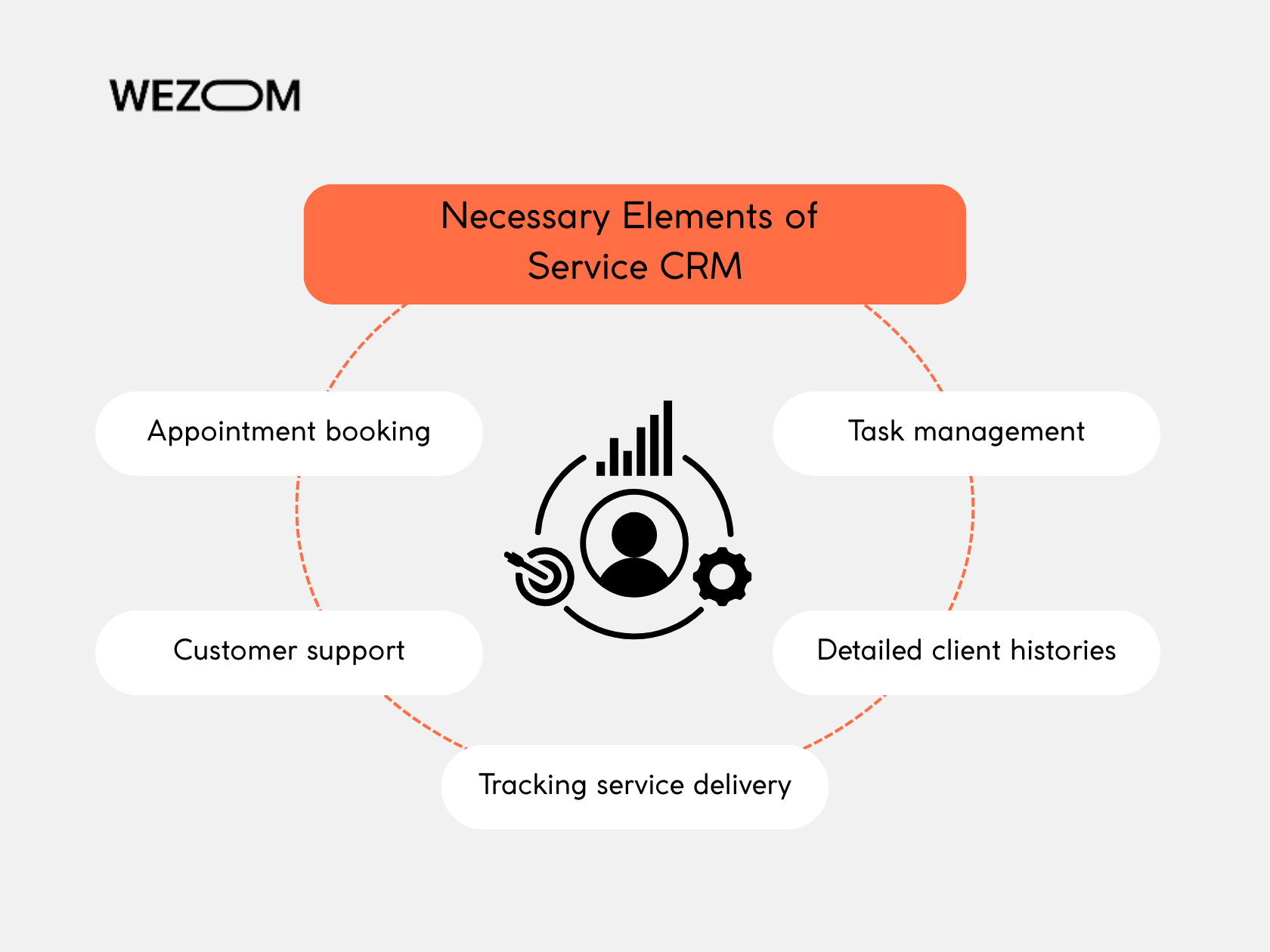
In contrast, product-based businesses focus more on sales cycles. Their CRM software should include:
- Pipeline management
- Order processing
- Automating marketing campaigns
- Tracking purchase behavior
- Managing stock levels
Businesses that combine products and services, such as tech companies offering software with support, require flexible CRM software. These CRMs should integrate the following:
- Lead management
- Transactional sales
- Inventory tracking
- Service management
That is why you must identify your company type before implementing some "best CRM software" that meets all the required functionality.
Core Features of Service CRM Software
As previously mentioned, a CRM for service providers must have specific features tailored to meet their operational needs. Without them, the main idea of integrating customer relationship management software is lost.
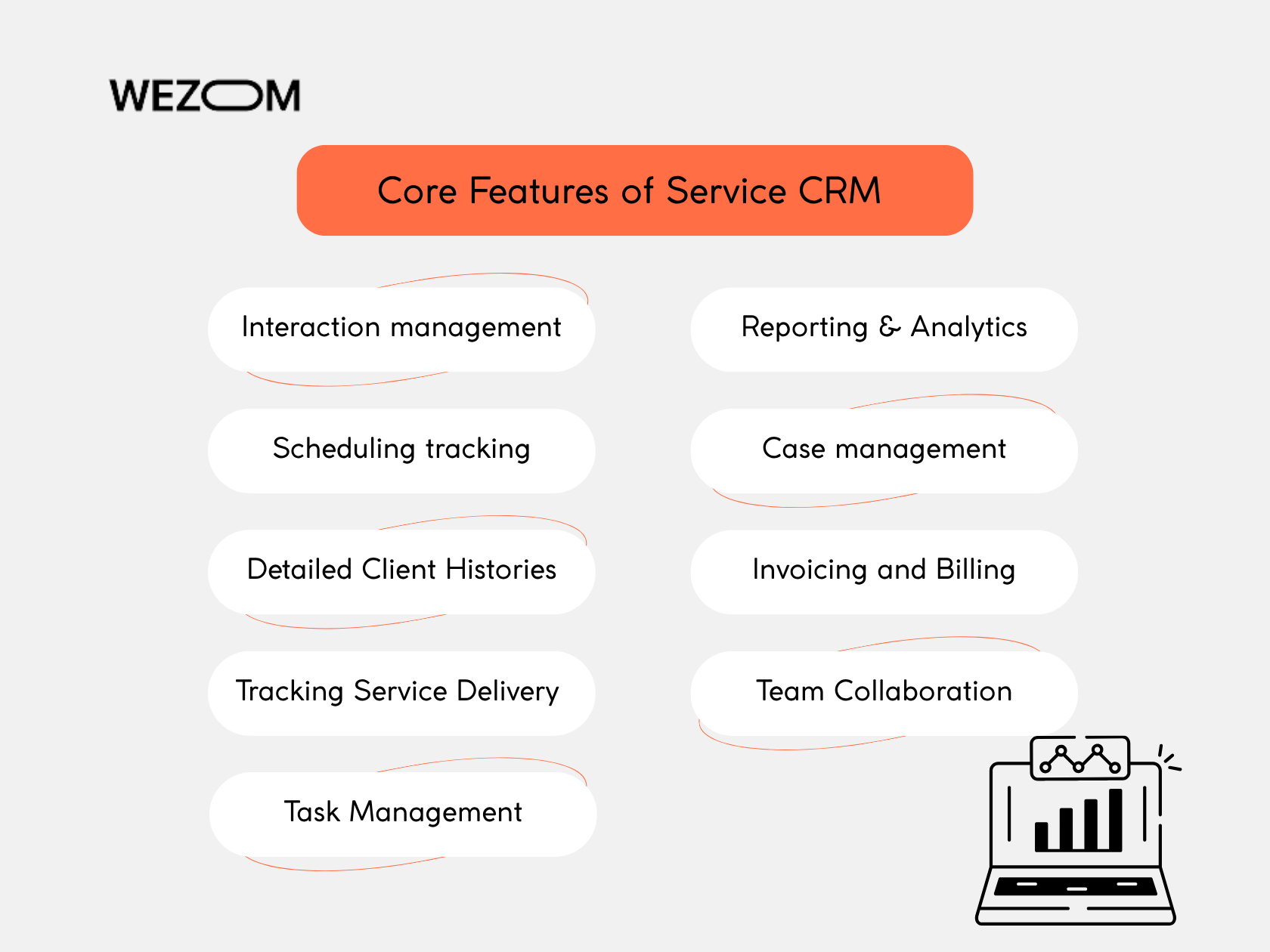
So, among the core functionality is:
Interaction management: This feature records all client and sales communications across channels, including email, phone, and chat. It automatically logs conversations and integrates communication tools within the CRM. The goal is to deliver personalized and consistent follow-ups regardless of the customer's communication channel.
Scheduling tracking: It organizes appointments and meetings by providing a shared calendar booking system. This feature syncs availability, sends reminders, and reduces manual coordination. It helps service businesses avoid missed appointments.
Task Management: This function assigns tasks related to client services. It also has automated reminders and follow-ups. This function uses tools such as dashboards, deadlines, and notifications to keep sales teams on track. The purpose is to support timely service delivery and boost the existing workflow.
Detailed Client Histories: This feature stores comprehensive profiles of each client, including past services, preferences, and communications, all in one place, providing teams with full context during every interaction. It allows staff to provide personalized service based on relevant information.
Tracking Service Delivery Over Time: This service monitors the progress and completion of ongoing services by logging milestones and collecting client feedback. This function helps maintain consistent service quality and address issues before they impact customer satisfaction.
Among additional features are:
- Reporting & Analytics
- Case management
- Invoicing and Billing
- Team Collaboration
All of them support service delivery and result in customer retention.
Benefits of CRM for Long-Term Client Relationship Management
A CRM enhances long-term customer relationship management by providing service business automation and tools that help businesses maintain professional communication with clients. As a result, CRM for a service business ensures stronger connections and increased client loyalty.
Key benefits include
- Enhanced client retention strategies through timely engagement
- Enabling personalized service delivery by leveraging detailed client histories,
- Increasing upsell and cross-sell opportunities with data-driven insights,
- Centralizing customer data to improve service team collaboration across departments.
Customer relationship management software helps identify client needs and preferences, making it easier to offer relevant upsells and cross-sells at the right time. This targeted approach boosts revenue and builds trust, as clients appreciate tailored solutions and consistent value throughout the relationship.
Best Service CRM Platforms in 2026
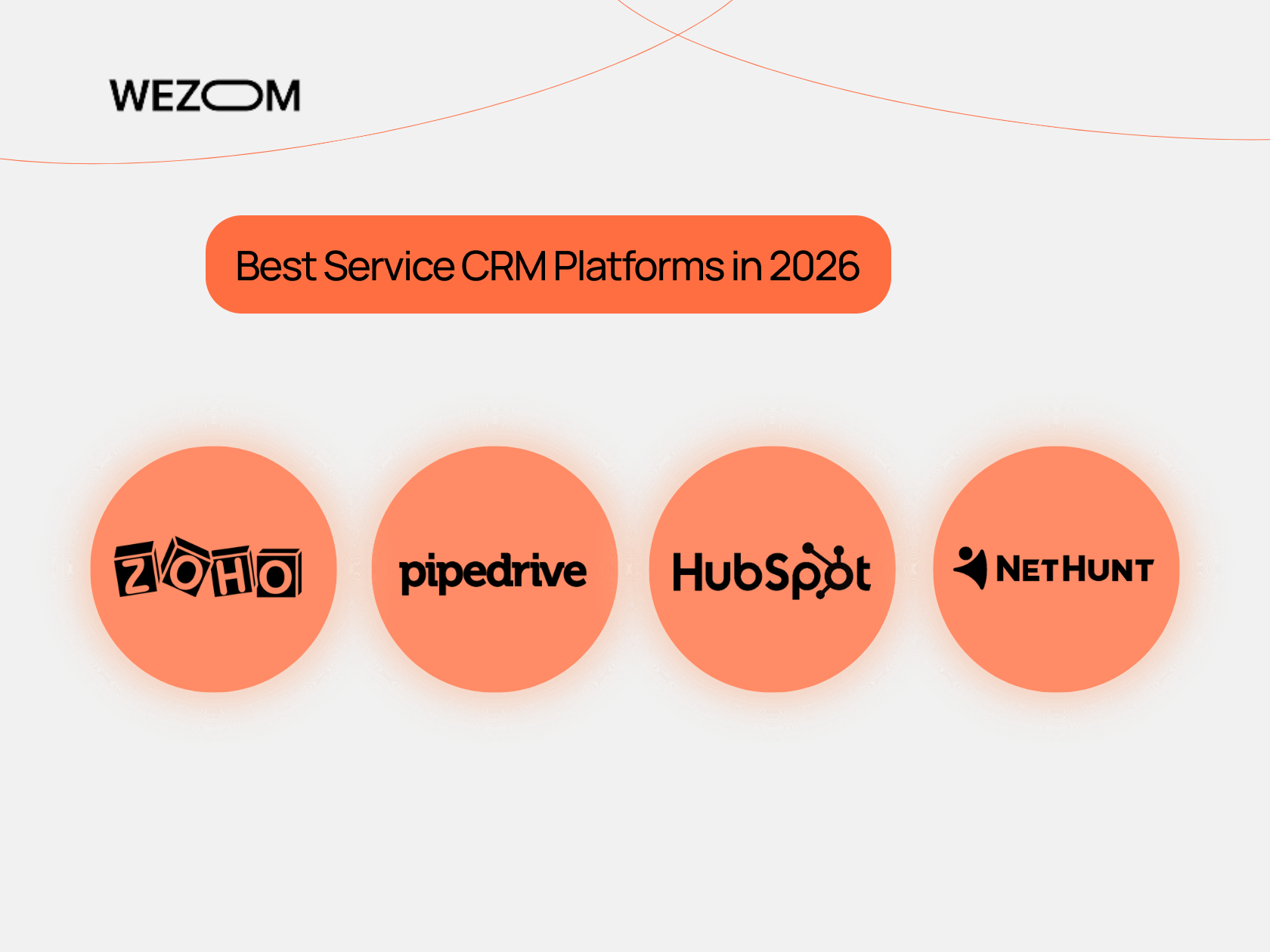
Overview of leading CRM platforms in 2026, such as Zoho CRM, HubSpot, NetHunt CRM, and Pipedrive:
Pipedrive

It is a simple sales CRM with one of the best user interfaces. Pipedrive helps businesses manage leads, track communications, and automate sales processes. Its intuitive user interface and visual pipeline management make it a popular choice for sales teams seeking clarity in their workflows. Pipedrive offers lead and deal management tools, email marketing integration, activity tracking, and workflow automation. These features enable service-based businesses to maintain organized client communications and improve productivity.
Benefits:
- Requires little effort for implementation and learning processes
- Businesses can tailor sales stages to match their unique processes
- Connection with over 400 third-party apps
Drawbacks:
- Lack of advanced marketing features found in some other CRMs
- Some functionalities, like revenue forecasting and e-signatures, are only available in premium plans
Unique Features:
- Visual Sales Pipeline: This tool offers a drag-and-drop interface for managing deals through various stages, providing clear visibility into the sales process
- LeadBooster Add-On: This add-on enhances lead generation with tools such as chatbots, web forms, and prospecting features, allowing you to capture and qualify potential customers efficiently
HubSpot

HubSpot CRM is a marketing-oriented CRM hub that manages all customer activity across multiple platforms. This powerful and intuitive system supports cloud integration, automates advertising campaigns, and manages sales. It is suitable for scaling businesses. HubSpot CRM provides tools for customer service management, marketing automation, and sales pipeline tracking.
Benefits:
- User-friendly interface with quick onboarding
- Seamless integration with various platforms like Shopify and Magento
Drawbacks:
- HubSpot is one of the most expensive CRM platforms, offering high-priced plans
- This system has limited customization potential compared to Zoho CRM
Unique Features:
- Marketing Automation Software: Initially, HubSpot was designed for automating marketing workflows. Hence, their CRM software offers versatile marketing tools, such as setting up marketing campaigns using marketing automation software powered by CRM data
- HubSpot Academy: Offers extensive free training resources and certifications
NetHunt
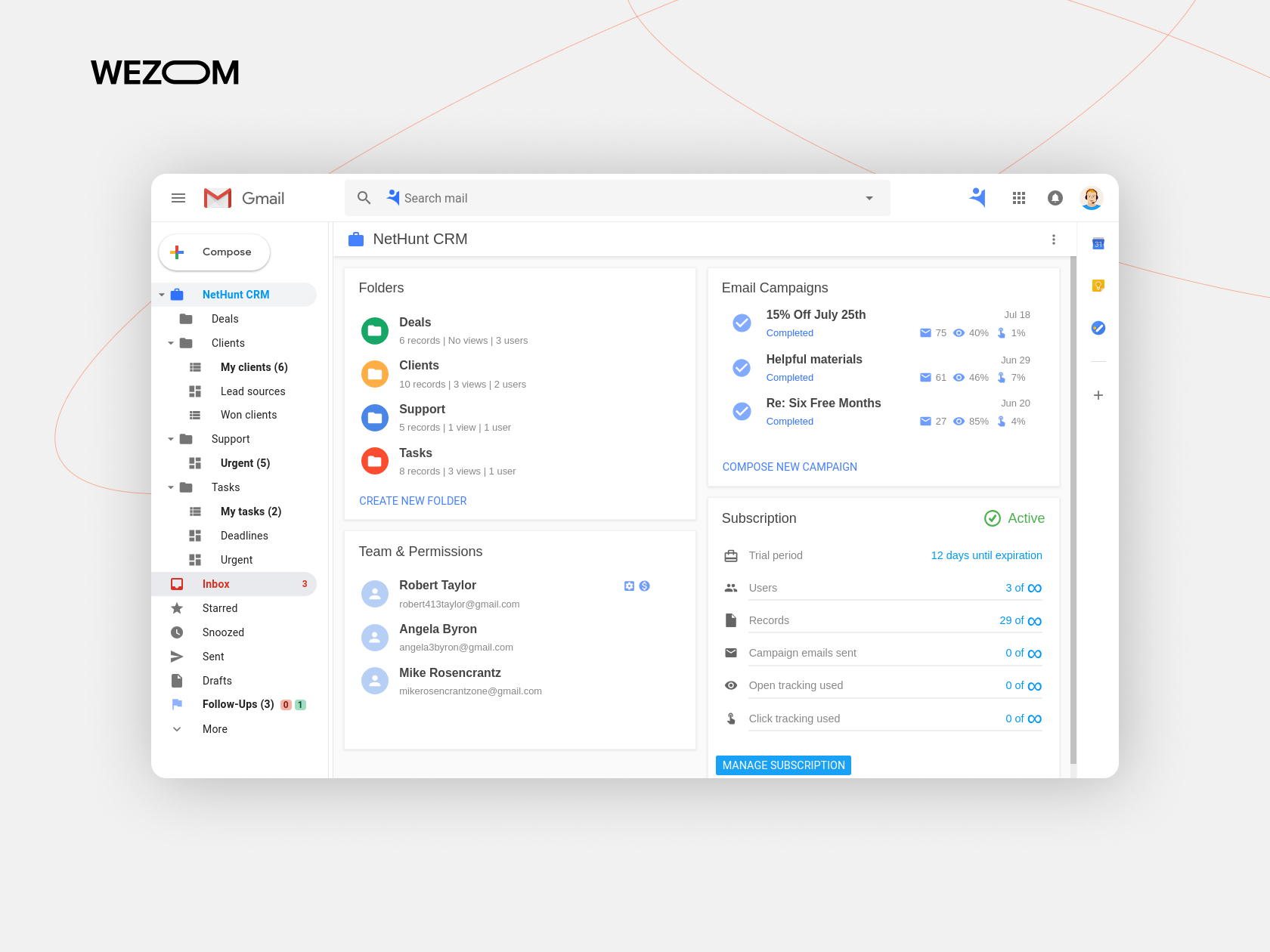
It is a perfect CRM for sales managers with easy-to-use tools that can be customized to suit service business needs. NetHunt can automate the lead generation process, track all sales activity, enable multiple channel engagement, and forecast revenue. It seems to be just integrated with Gmail, but it is literally built into it. The system also integrates with other Google Workspace tools. NetHunt offers a 14-day free trial with no user limitations and free CRM tools.
Benefits:
- Management emails and CRM customer data directly within Gmail
- Robust automation of repetitive tasks, such as lead distribution and follow-ups
- Tailor sales pipelines to fit specific business processes and track deal progress
Drawbacks:
- Limited opportunities to customize the system for the processes
- Weak built-in analytics CRM tool
Unique Features:
- Native Gmail Integration: Unlike most CRMs that connect externally, NetHunt is fully embedded inside Gmail, letting users manage CRM data directly from their inbox
- LinkedIn Lead Clipper: A built-in tool to capture leads straight from LinkedIn profiles into the CRM with a single click, streamlining lead generation from LinkedIn
Zoho CRM

Zoho CRM is a popular, highly customizable CRM platform suitable for businesses of all sizes and types. It can manage sales and marketing, register all customer requests, and track inventory in one system. This CRM offers advanced features to help businesses grow. Zoho CRM also has tools for scheduling, job dispatching, vendor management, and omnichannel communication.
Benefits:
- Affordable pricing with a free trial, but only for three users
- Extensive customization options to fit unique business processes
- Integration with over 50 Zoho applications and many more third-party tools
Drawbacks:
- The CRM functionality complicates the program's interface, so users require training to master it
- Zoho CRM has limited capabilities of modules related to financial and commodity accounting
Unique Features:
- Zia AI Assistant: Provides predictive sales analytics and workflow automation
- Canvas Design Studio: Allows users to create personalized CRM interfaces without coding manually
Choosing the Best CRM Software Fitting Your Company
There are so many different CRM solutions that choosing the wrong one is a common situation. When selecting the right CRM software options, it is crucial to align the system's functionality with the company's size, complexity, and growth stage. Below, see how popular customer relationship management solutions fit different types of service businesses.
Zoho CRM: Best for scaling companies needing customization
Zoho is a strong choice for expanding service businesses that need a flexible platform. It works best for:
- Service businesses that start to scale and require comprehensive automation tools across operations
- Companies that want a powerful cloud-based CRM system with customizable modules
- Businesses that prefer to pay only for the features they use and select modules that fit their current needs
- Small and medium-sized companies with increasingly complex workflows that simpler CRMs can't handle
NetHunt CRM: Ideal for first-time CRM users in service businesses
NetHunt offers simplicity and streamlined organization, making it a practical CRM software for service providers new to CRM tools and small businesses. It works best for:
- Service businesses implementing a CRM system for the first time, transitioning from spreadsheets to an integrated platform
- Startups and small businesses that frequently adjust their services, products, or internal processes
- Companies that need standard CRM functionality without complex customizations or the high cost of custom development
Pipedrive CRM: Best CRM Software for companies with longer sales cycles
Pipedrive is an intuitive CRM software for service businesses that manage sales pipelines, especially with medium to long cycles. It works best for:
- Medium-sized and small companies with medium or long sales cycles
- Startups that need a simple, quick-to-launch CRM system without rigid structures
- Large enterprises looking for a CRM that's user-friendly for employees and external partners alike
- IT service companies or product-focused companies with long nurturing processes for leads
- Non-profit organizations with unique and complex management processes that need structured oversight
- Highly specialized service businesses with repetitive workflows that benefit from automation
Choosing the right service CRM software depends on whether you prioritize customization, ease of use, standard features, or scalability. Each platform has strengths tailored to specific operational needs, helping service businesses build long-term customer relationships efficiently.
HubSpot CRM: Perfect CRM solution for long-term B2B sales cycles
HubSpot CRM is a powerful choice for service-based companies with long B2B sales processes. Its all-in-one platform is tailored for managing leads through multiple touchpoints over extended periods. It works best for:
- IT service providers and SaaS companies with long, multi-stage sales cycles
- B2B companies that rely on nurturing relationships over time rather than fast conversions
- Marketing and sales teams that need seamless integration between outreach, automation, and client management
- Organizations looking to align content marketing, lead tracking, and customer support in a single system
Real Use Case: How CRM Integration Boosted a Service Business
The CRMiUM portfolio included a case of a property rental insurance service business in Israel - "Diffe-rent". This company, which serves over 5,000 owners, needed to enhance its Zoho CRM system to address operational inefficiencies.
Challenges before CRM integration:
- Manual cost calculations cause delays and errors
- No automated card validation, leading to payment issues
- Manual benefit payouts reduce managers' productivity
- Critical communications are handled via WhatsApp, lacking organization
- Risk assessments performed outside the CRM software
Implemented CRM improvements:
- Automated service charge calculations based on contract details
- Card validity checks integrated into client interactions
- CRM integration with Sumit for automated payment processing
- Built-in risk assessment module for better evaluation
- Automatic notifications for account managers via Zoho Cliq
Results:
This enhanced CRM for service business streamlined billing, improved transaction security, reduced manual work, and centralized customer data, boosting efficiency and client management.
Future Trends: AI, Automation, and the Next Generation of Service CRM
Rapid technological advancements are shaping the future of CRM for the service industry. Artificial intelligence, automation, and advanced analytics are transforming how businesses manage client relationships. These tools shift service CRM from reactive management to proactive engagement.
CRM predictive analytics will analyze behavior patterns to forecast future actions, such as service renewals or potential churn. This feature helps businesses act in advance, enhancing retention and satisfaction.
Automated CRM workflows will eliminate repetitive tasks. From scheduling follow-ups to sending personalized emails, automation allows sales reps to not worry about customer interaction. Sales, marketing, and customer service teams can focus more on strategic activities while the CRM handles routine processes.
Personalized chatbots at scale will redefine customer interactions. These AI-powered assistants will provide instant, tailored responses 24/7. They will handle common queries, book appointments, and even recommend services based on client history.
According to Gartner (Gartner, Inc. is an American research and consulting company specializing in business and technology), agentic AI will autonomously resolve 80 percent of common customer service issues without human intervention by 2029. Additionally, this will result in a 30% reduction in operational costs. AI-driven insights will allow companies to anticipate client needs before they arise.
Emerging technologies will also improve decision-making. Service-based companies will gain a clearer view of client journeys with real-time data. Such innovations lead to more informed strategies and better resource allocation.
In short, future CRMs will be smarter, faster, and more intuitive. They will enable service businesses to deliver hyper-personalized experiences that boost efficiency. CRM for a service industry will build long-term customer relationships through intelligent automation and data-driven actions.
Conclusion
Building long-term client relationships begins with choosing the right CRM for a service business that aligns with its goals. However, many companies attempt to set up everything on their own, underestimate the complexity, and end up with poorly configured systems that fail to deliver results.
To successfully implement a customer relationship management system in service businesses, it's vital to partner with experts like CRMiUM, a trusted contractor who ensures seamless setup, integration, and optimization. Service-based companies can drive growth and deliver exceptional client experiences with the right CRM solution.
